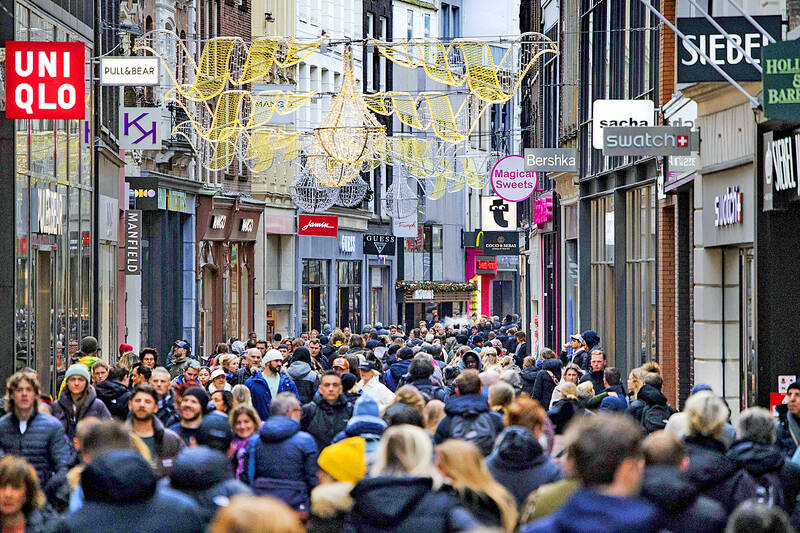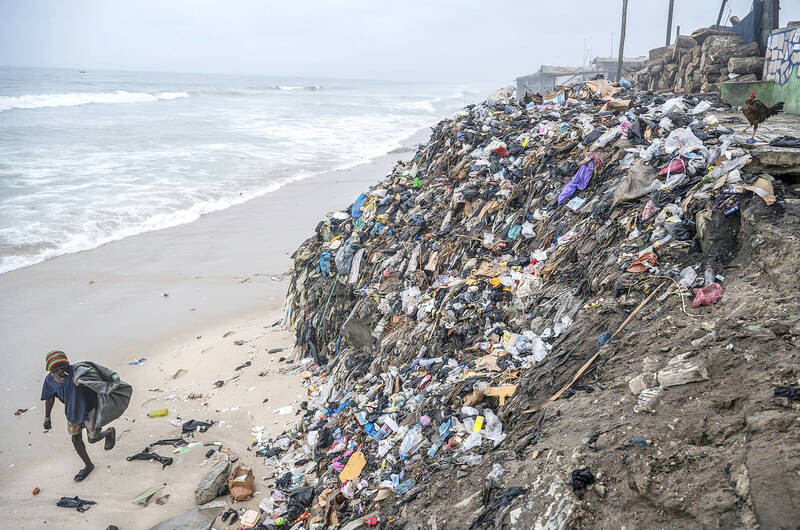Ikram Cakir hands over a multicolored blue and white blouse and selects a similar item, this time in hot pink. Welcome to Amsterdam’s “fashion library.”
Billed as one of the world’s only physical centers for renting used and new clothing, the “big shared wardrobe” in the Dutch capital is a response to clothes waste and fashion industry pollution.
Hundreds of brightly colored pants, coats and overalls are sorted by brand or style, each with a tag indicating a sale price or how much it costs to rent the item per day.

Photo: EPA-EFE
The daily rental price varies from about 0.50 euros (US$0.55) to a couple of euros, depending on the customer’s loyalty — how often they rent clothes and how many are borrowed.
For Cakir, a 37-year-old campaign manager at a non-governmental organization, the concept is “just really good.”
“So many clothes are bought and then never used,” she said.

Photo: Bloomberg
“This is an excellent way to wear new clothes without depleting the planet,” she added.
Globally, the equivalent of a truckload of clothes is burnt or buried in landfills every second, according to the Ellen MacArthur Foundation, a charity focused on eliminating waste and pollution.
The textile industry is also a major polluter, causing 2 to 8 percent of global carbon emissions, the UN said in 2022.
In the era of fast fashion, the average person buys 60 percent more clothing than 15 years ago, while each item is kept for only half as long, the UN says.
Fashion is responsible for one-quarter of the pollution of the world’s waters and one-third of microplastic discharges into the oceans — toxic substances for fish and humans.
All this prompted Elisa Jansen to open “LENA, the fashion library” in a trendy area in central Amsterdam, with her two sisters and a friend.
“Why did we open in 2014? Because the fashion industry is one of the most polluting industries in the world,” she said.
The library also has an online section, plus drop-off and collection points in other Dutch cities.
“Always new clothes. Good for the planet. Experiment with your style. Try before you buy,” reads a poster hanging above LENA’s counter and washing machines, summing up its philosophy.
Jansen’s career began in vintage shops so she said she has “always worked in recycling clothes.”
However, the vintage business did not allow her to acquire new items and she found it too homogenous a style.
“That’s when I got the idea of sharing clothes in a massive shared wardrobe,” she said.
Customers sign up for a 10-euro fee, allowing them to borrow or buy clothes from the collection.
The store has more than 6,000 members, but not everyone is a regular borrower, Jansen said.
Her top priority is the quality of her garments, always preferring longer-lasting brands.
“You won’t find any fast fashion here,” she said, referring to a trend where garments are bought cheaply then discarded after only a few wears.
LENA was “really one of the first of its kind” when it opened nine years ago, she said.
Similar initiatives have been launched in places such as Australia, Canada, France, Scandinavia, Switzerland and the UK, although Jansen said that the Scandinavian outlets appeared to have closed since.
It took some time to find a profitable business model, she said.
Her location in a trendy area mostly attracts women aged 25 to 45 “who want to make sustainable choices, but who also want pretty clothes.”
India Donisi, a 35-year-old wine blogger, is the target audience.
“It’s really very convenient,” she said as she tried on what she called an “extravagant” fuchsia pink blazer.
Donisi regularly rents clothes from the library to wear for media events, but she lives around the corner and said she would not cross town to borrow an outfit.
Jansen said she hopes her initiative will inspire others.
“I really believe this is the future. Our consumption cannot continue as it is,” she said. “I hope other clothing brands will even do it themselves ... so you always have the option to borrow if you don’t want to buy.”

Sweeping policy changes under US Secretary of Health and Human Services Robert F. Kennedy Jr are having a chilling effect on vaccine makers as anti-vaccine rhetoric has turned into concrete changes in inoculation schedules and recommendations, investors and executives said. The administration of US President Donald Trump has in the past year upended vaccine recommendations, with the country last month ending its longstanding guidance that all children receive inoculations against flu, hepatitis A and other diseases. The unprecedented changes have led to diminished vaccine usage, hurt the investment case for some biotechs, and created a drag that would likely dent revenues and

Global semiconductor stocks advanced yesterday, as comments by Nvidia Corp chief executive officer Jensen Huang (黃仁勳) at Davos, Switzerland, helped reinforce investor enthusiasm for artificial intelligence (AI). Samsung Electronics Co gained as much as 5 percent to an all-time high, helping drive South Korea’s benchmark KOSPI above 5,000 for the first time. That came after the Philadelphia Semiconductor Index rose more than 3 percent to a fresh record on Wednesday, with a boost from Nvidia. The gains came amid broad risk-on trade after US President Donald Trump withdrew his threat of tariffs on some European nations over backing for Greenland. Huang further

CULPRITS: Factors that affected the slip included falling global crude oil prices, wait-and-see consumer attitudes due to US tariffs and a different Lunar New Year holiday schedule Taiwan’s retail sales ended a nine-year growth streak last year, slipping 0.2 percent from a year earlier as uncertainty over US tariff policies affected demand for durable goods, data released on Friday by the Ministry of Economic Affairs showed. Last year’s retail sales totaled NT$4.84 trillion (US$153.27 billion), down about NT$9.5 billion, or 0.2 percent, from 2024. Despite the decline, the figure was still the second-highest annual sales total on record. Ministry statistics department deputy head Chen Yu-fang (陳玉芳) said sales of cars, motorcycles and related products, which accounted for 17.4 percent of total retail rales last year, fell NT$68.1 billion, or

Macronix International Co (旺宏), the world’s biggest NOR flash memory supplier, yesterday said it would spend NT$22 billion (US$699.1 million) on capacity expansion this year to increase its production of mid-to-low-density memory chips as the world’s major memorychip suppliers are phasing out the market. The company said its planned capital expenditures are about 11 times higher than the NT$1.8 billion it spent on new facilities and equipment last year. A majority of this year’s outlay would be allocated to step up capacity of multi-level cell (MLC) NAND flash memory chips, which are used in embedded multimedia cards (eMMC), a managed